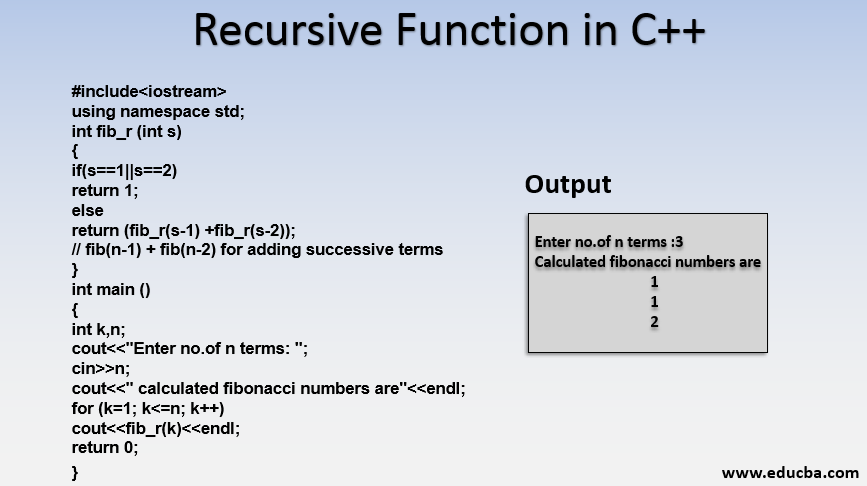5 Ways to Calculate Power of Two in C Recursively

Calculating the power of two is a fundamental operation in computer science, often used in algorithms, bit manipulation, and performance optimization. In the C programming language, there are multiple ways to achieve this, particularly using recursion. Recursion, while elegant, requires careful consideration to avoid stack overflow and ensure efficiency. Below, we explore five distinct recursive methods to calculate the power of two in C, each with its own advantages and trade-offs.
1. Direct Recursive Approach
The most straightforward method involves a direct recursive function. However, this approach can lead to inefficiency and potential stack overflow for large exponents.
#include <stdio.h>
unsigned long long powerOfTwo(int n) {
if (n == 0) return 1;
return 2 * powerOfTwo(n - 1);
}
int main() {
int exponent = 10;
printf("2^%d = %llu\n", exponent, powerOfTwo(exponent));
return 0;
}
Pros: Simple and easy to understand.
Cons: Inefficient for large n due to repeated multiplications and risk of stack overflow.
2. Optimized Recursive Approach with Tail Recursion
Tail recursion can be optimized by the compiler to avoid stack overflow. This method modifies the function to pass an accumulator, reducing redundant calculations.
#include <stdio.h>
unsigned long long powerOfTwoHelper(int n, unsigned long long acc) {
if (n == 0) return acc;
return powerOfTwoHelper(n - 1, acc * 2);
}
unsigned long long powerOfTwo(int n) {
return powerOfTwoHelper(n, 1);
}
int main() {
int exponent = 20;
printf("2^%d = %llu\n", exponent, powerOfTwo(exponent));
return 0;
}
Pros: More efficient and safer for larger exponents.
Cons: Slightly more complex due to the helper function.
3. Bitwise Shift Operation
Leveraging bitwise shifts is a non-recursive but highly efficient method to calculate powers of two. While not recursive, it’s worth mentioning for comparison.
#include <stdio.h>
unsigned long long powerOfTwo(int n) {
return 1ULL << n;
}
int main() {
int exponent = 30;
printf("2^%d = %llu\n", exponent, powerOfTwo(exponent));
return 0;
}
Pros: Extremely efficient with constant time complexity O(1).
Cons: Not recursive, but included for completeness.
4. Recursive Approach with Memoization
Memoization stores previously computed values to avoid redundant calculations. This method is particularly useful for repeated calculations of the same exponent.
#include <stdio.h>
#define MAX_EXPONENT 30
unsigned long long memo[MAX_EXPONENT + 1];
unsigned long long powerOfTwo(int n) {
if (n == 0) return 1;
if (memo[n] != 0) return memo[n];
memo[n] = 2 * powerOfTwo(n - 1);
return memo[n];
}
int main() {
int exponent = 25;
printf("2^%d = %llu\n", exponent, powerOfTwo(exponent));
return 0;
}
Pros: Reduces redundant calculations, improving performance for repeated exponents.
Cons: Requires additional memory for storing memoized values.
5. Divide and Conquer Recursive Approach
This method splits the problem into smaller subproblems, reducing the number of recursive calls.
#include <stdio.h>
unsigned long long powerOfTwo(int n) {
if (n == 0) return 1;
unsigned long long half = powerOfTwo(n / 2);
return (n % 2 == 0) ? half * half : 2 * half * half;
}
int main() {
int exponent = 15;
printf("2^%d = %llu\n", exponent, powerOfTwo(exponent));
return 0;
}
Pros: Reduces the number of recursive calls, improving efficiency.
Cons: Slightly more complex logic compared to direct recursion.
Comparative Analysis
| Method | Efficiency | Stack Usage | Complexity | Best Use Case |
|---|---|---|---|---|
| Direct Recursive | Low | High | Simple | Small exponents |
| Tail Recursion | Moderate | Low | Moderate | Larger exponents |
| Bitwise Shift | High | None | Simple | All cases (non-recursive) |
| Memoization | High | Moderate | Moderate | Repeated calculations |
| Divide and Conquer | High | Moderate | Complex | Large exponents |

Key Takeaways
FAQ Section
Why is direct recursion inefficient for large exponents?
+Direct recursion performs redundant multiplications and consumes stack space proportionally to the exponent, leading to inefficiency and potential stack overflow.
What is tail recursion, and why is it useful?
+Tail recursion places the recursive call as the last operation, allowing compilers to optimize it into a loop, reducing stack usage and improving performance.
When should I use bitwise shifts instead of recursion?
+Use bitwise shifts when calculating powers of two for any exponent, as it’s efficient (O(1)) and avoids recursion overhead.
How does memoization improve recursive power calculations?
+Memoization stores results of expensive function calls, reusing them for repeated inputs, significantly reducing computation time.
By understanding these methods, developers can choose the most appropriate approach based on their specific needs, balancing between simplicity, efficiency, and resource usage.



